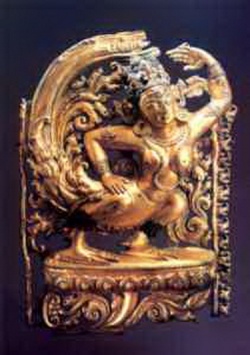Difference between revisions of "Jinnalaluo"
Jump to navigation
Jump to search
| Line 1: | Line 1: | ||
| + | [[File:Kinnara.JPG|thumb|250px|]] | ||
| − | + | The [[jinnalaluo]] (also called [[kimnaras]], [[feiren]], and [[yeishen]]) were [[divine creatures]] with [[human]] [[bodies]] and [[animal's]] heads that were featured in [[Buddhist mythology]]. | |
| − | The [[jinnalaluo]] (also called [[kimnaras]], feiren, and yeishen) were [[divine]] | ||
| Line 13: | Line 13: | ||
==Role in {{Wiki|Chinese mythology}}== | ==Role in {{Wiki|Chinese mythology}}== | ||
| − | They are [[celestial musicians]], whose [[music]] is said to fill [[Heaven]]. They play a variety of instruments and are linked to a very {{Wiki|ancient Indian}} [[art form]], where they are portrayed as birds-of-paradise. | + | They are [[celestial musicians]], whose [[music]] is said to fill [[Heaven]]. They play a variety of instruments and are linked to a very {{Wiki|ancient Indian}} [[art form]], where they are portrayed as [[birds-of-paradise]]. |
Latest revision as of 16:40, 3 February 2016
The jinnalaluo (also called kimnaras, feiren, and yeishen) were divine creatures with human bodies and animal's heads that were featured in Buddhist mythology.
Description
These beings resemble human bodies and have the heads of animals, most notably horses or birds.
Role in Chinese mythology
They are celestial musicians, whose music is said to fill Heaven. They play a variety of instruments and are linked to a very ancient Indian art form, where they are portrayed as birds-of-paradise.
